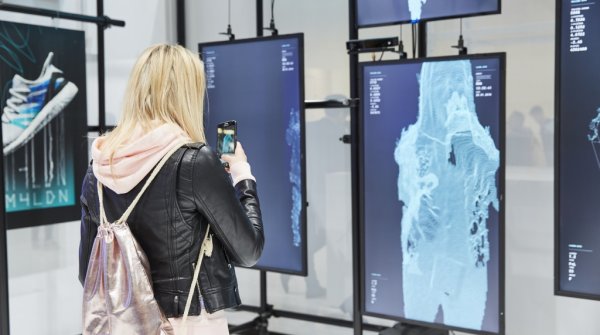
"B2B is a big topic for us", says Mischa Krewer, owner of the sneaker store 43einhalb. Two stationary shops in Fulda and Frankfurt as well as an online shop belong to the company; the online shop has received several awards. Most recently, he won the prestigious Internet World Business Shop Award 2018 in the Online Pure Player category - just behind Zalando and About You. Digital processes are a matter of course for Krewer, but not necessarily for its suppliers: "Some manufacturers are better in that field and there are some with room for improvement. Those who don't yet have B2B presences fall through the cracks because the old 'order form and then fax' madness simply doesn't make sense for our workflow.
More and more retailers think like Krewer. This is especially true for young people who grew up shopping online and don't understand why they should still use faxes or the like. They want lean, efficient and fast business processes and demand the same from their suppliers.
The advantages of digitized processes between retailers and manufacturers are obvious - they are the same ones that have made B2C online retail so successful: You save time and you can use them around the clock. Via mobile websites even with a smartphone, because even dealers are not sitting at the computer all day.
Mischa Krewer: "Small retailers in particular are dependent on being able to reorder from their brands or obtain certain information even after closing time.” While in the past people often hung on hold or did not reach anyone at all after 6 p.m., digital B2B connections enable fast results. For Krewer, digitization is a form of customer loyalty.
Tim Böker of the Essen-based digital agency Kommerz was also asked to simplify the processes for the B2B shop of Borussia Dortmund and set them up more efficiently. The affiliated retailers include supermarkets as well as petrol stations and sports shops. Böker: "This involved quite complex ordering processes, e.g. visual merchandising and curated product combinations of fan articles".
Especially for manufacturers serving an international market, digitized process and data management offers further advantages. Austrian sports equipment manufacturer Boards & More, specialist for windsurfing, kitesurfing and stand-up paddling, has been using a digital B2B solution since the beginning of the year for order processing and the provision of product information in international business. Gregor König of Boards & More: "Typically, pre-orders for the current collection account for around 30 percent of orders, 70 percent are received during the year. That means we needed an international e-commerce solution that would simplify product selection and reordering for retailers with comprehensive information and provide real-time information on availability and delivery time".
The B2B shop, translated into five languages, contains around 15,000 articles, including all product variants and spare parts. At the same time, the solution automatically makes data such as product numbers, price recommendations or availability available to retailers in real time.
In the long term, automation is an important point: Only a B2B infrastructure provides the basis for the integration of artificial intelligence and finally for automated or anticipatory orders.

Manufacturers and retailers can also exchange product information efficiently and error-free via B2B connections. Viking Footwear and Deuter have transferred this task to the IT service provider Loadbee from Stuttgart, which brings together all information, videos and care instructions for the products on one platform and makes them available to retailers.
As a pilot project in Germany, Viking was thus able to do without the printed catalogue for the first time. The advantage: "The digital catalogue is always up to date - all changes can be easily inserted at any time and are available to everyone in real time," explains Helma Tobies from Viking Footwear.
Videos can also be played via the platform at any time in the online shop, at the retailers' stationary POS or via social media. The retailer does not need special technical requirements for this. "A retailer can also scan products via tablet or smartphone using the Loadbee app and all available information is displayed," Tobies continues. Retailers can use this service in the store to read up on details, but also their own sales staff can call up relevant information at any time.

Although there have been digital ordering options for retailers for some time now, "B2B e-commerce is still in the Stone Age", says Tim Böker from Kommerz, compared to the effort manufacturers put into maintaining and further developing their B2C online shops. "The trend is only slowly reaching small and medium-sized businesses and will go through the roof for the next few years."
B2B e-commerce works according to similar laws as the B2C online shop, but not entirely. Böker: "Of course you expect the same usability, but there are important differences". Time plays an important role again: users want to do their job and are not looking for entertainment, they buy specifically and not impulsively. It must also be regulated whether all dealers see the same products, whether prices are the same and what limits exist.
It is important to focus on the user, as many manufacturers still lack customer orientation in B2B e-commerce. The processes are designed as pure sales machines completely on quantity and orient themselves at the structures of the own organization – regardless whether these make sense for the customers.
"B2B requires an active exchange process between partners," says Manfred Bayer-Lemerz of Sana Commerce, an IT service provider who developed the B2B solution with Boards & More. In order to come to better solutions, the store 43einhalb already makes suggestions for improvements to its suppliers for online tools. The good thing is: "The brands listen - they want to improve things," says owner Mischa Krewer.
There are still many difficulties in implementing digital B2B solutions. This starts with the fact that data quality is often not good or is stored in too many separate systems. Resistance also arises within the company itself. For many, digitization is synonymous with job loss - especially for the field crew, where digital ordering processes rationalize away classic tasks. "Routine work is no longer necessary," admits Manfred Bayer-Lemerz of Sana Commerce. "But you gain time for the real task: selling and taking care of customers."
In the B2B area, the retailers’ customer journeys in the B2B shop can also provide points of contact for sales talks and retailer profiles can be compiled and evaluated. Resistance will not stop the progressive digital transformation. "Companies often only act when sales decline," says Bayer-Lemerz. "But then market shares have already been lost to the competition."
- Awards
- Mountain sports
- Bike
- Fitness
- Health
- ISPO Munich
- Running
- Brands
- Sustainability
- Olympia
- OutDoor
- Promotion
- Sports Business
- Textrends
- Triathlon
- Water sports
- Winter sports
- eSports
- SportsTech
- OutDoor by ISPO
- Heroes
- Transformation
- Sport Fashion
- Urban Culture
- Challenges of a CEO
- Trade fairs
- Sports
- Find the Balance
- Product reviews
- Newsletter Exclusive Area
- Magazine






